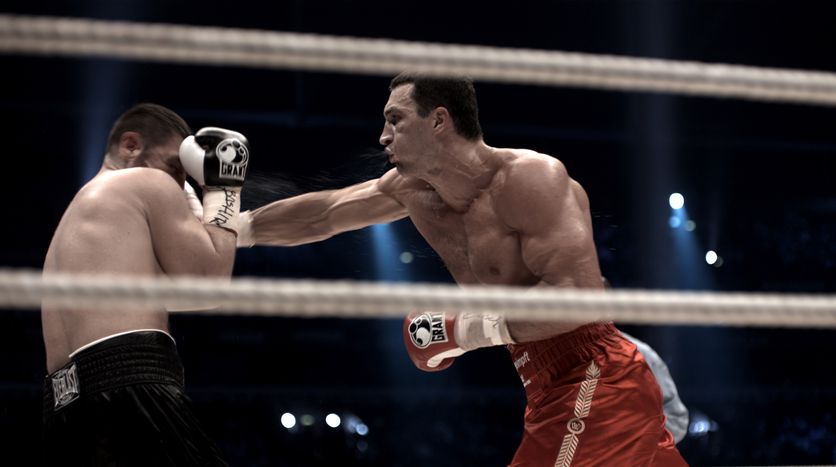
Euromaidan, Ukraine: Who is vitali Klitschko?
Published on
World heavy weight boxing 'champion emeritus' Vitali Klitschko has taken up politics during his semi-retirement from boxing. But this is no pensioner's quiet life he's leading. Klitschko is at the forefront of anti-government protests in Kiev. Yanukovych seems ever-more likely to fall. Klitschko seems ever-more likely to play a significant role in government. But who is Klitschko exactly?
The violence is mounting in Ukraine. More and more government offices are being occupied. Buildings are burning. Molotov cocktails are flying. Protestors are dying. And President Viktor Yanukovych’s grip on power is becoming ever weaker. He has offered concessions, proposing the role of prime minister to Arseniy Yatsenyuk of the 'Fatherland' Party and deputy to Vitali Klitschko who heads his own aptly named party UDAR (punch). But Yatsenyuk and Klitschko perceive these concessions as a cunning attempt to castrate the rising forces of change. They will accept nothing less than Yanukovych’s resignation and new elections, elections which Vitali Klitschko looks well placed to win. But who is Klitschko really? How has he enjoyed such a meteoric rise in Ukrainian politics?
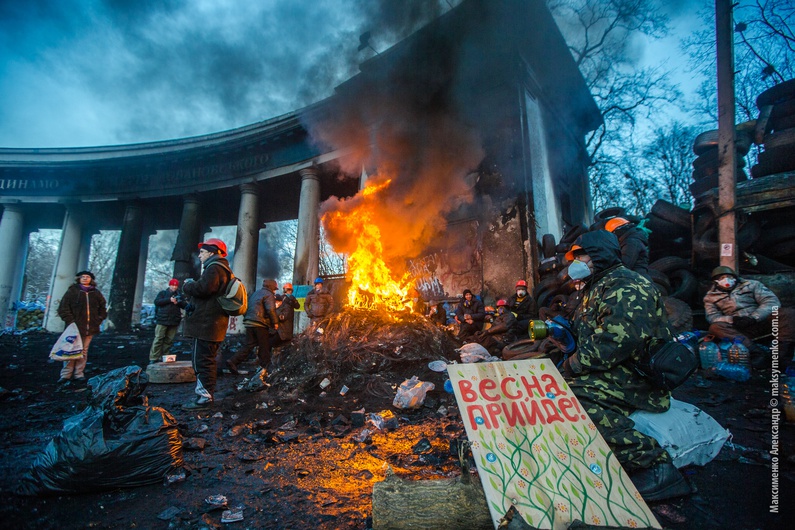 As the first boxing world champion to hold a degree, Klitschko’s combination of brains and brawn earned him the title ‘Dr. Ironfist’. 6ft 7in tall and weighing 17 stone, he is a veritable beast. He was never knocked out and won 45 of his 47 professional fights. Violence provides a useful point of comparison between Klitschko and his rival President Yanukovych. Klitschko's fighting temperament exudes maturity, calm and compassion. After his first knockout victory against Brit, Richard Vince in 1994 he sought out the defeated fighter's family to apologise, vowing his own family would never attend his fights. His finesse in the ring, his decade of world heavy weight dominance and his commendable sportsmanship have long been a source of Ukrainian national pride.
As the first boxing world champion to hold a degree, Klitschko’s combination of brains and brawn earned him the title ‘Dr. Ironfist’. 6ft 7in tall and weighing 17 stone, he is a veritable beast. He was never knocked out and won 45 of his 47 professional fights. Violence provides a useful point of comparison between Klitschko and his rival President Yanukovych. Klitschko's fighting temperament exudes maturity, calm and compassion. After his first knockout victory against Brit, Richard Vince in 1994 he sought out the defeated fighter's family to apologise, vowing his own family would never attend his fights. His finesse in the ring, his decade of world heavy weight dominance and his commendable sportsmanship have long been a source of Ukrainian national pride.
Yanukovych, on the other hand, has a history of 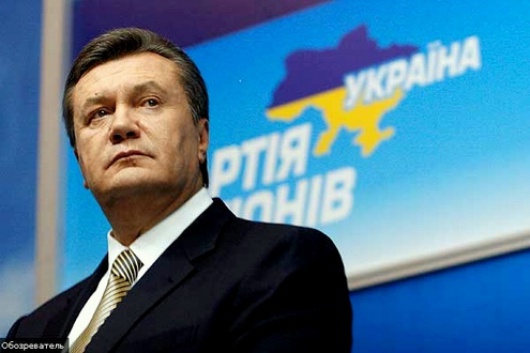 violence that is so sordid and shameful you wonder how he is even allowed to participate in politics. In 1967 Yanukovych was convicted to three years in prison for robbing a man his friends had punched unconscious. Yanukovych was imprisoned again in 1969, sentenced to two years for his role in a drunken brawl. Accusations that Yanukovych was involved in the gang rape and beating of a woman in Enakieve in the 1970s have not been proven but they contribute to his murky, tainted past.
violence that is so sordid and shameful you wonder how he is even allowed to participate in politics. In 1967 Yanukovych was convicted to three years in prison for robbing a man his friends had punched unconscious. Yanukovych was imprisoned again in 1969, sentenced to two years for his role in a drunken brawl. Accusations that Yanukovych was involved in the gang rape and beating of a woman in Enakieve in the 1970s have not been proven but they contribute to his murky, tainted past.
Klitschko’s PhD sets him apart, not only from other boxers, but also from other politicians. None more so than the president he his trying to topple: education provides another excellent point of comparison between the two. Klitschko’s PhD earned him the endearing nickname Dr. Iron Fist. Yanukovych’s masters in international law and his PhD in economics have been nothing but a thorn in his side, namely because they are falsified. He allegedly obtained both certificates whilst working full time as governor of Donetsk. His press secretary Ivanesko could not even name the university where he studied, although he was sure it was somewhere in Donetsk. ‘He even headed a department there and gave lectures,’ Ivanesko claims.
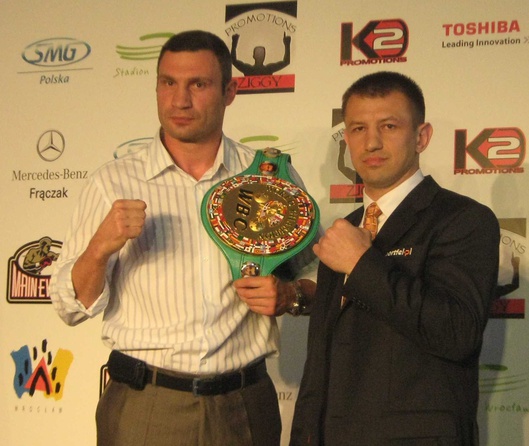 Politics in Ukraine has largely been defined by a dislocation between words and action. The last few decades have been dominated by false dawns. The euphoria of independence in 1991 soon gave way to despair as years of political chaos, social deprivation and economic ruin ensued. The 2004 Orange Revolution saw the country glowing with optimism, but this was quickly extinguished as a revolution that promised unity produced a presidency of in-fighting and disintegration. Viktor Yushchenko turned optimism sour by failing to tackle endemic corruption, overseeing gas disputes with Russia that saw supplies cut off in the depths of winter and engaging in politically paralysing squabbles with his Prime Minister Yulia Tymoshenko. Klitschko’s current ally-cum rival, Arseniy Yatsenyuk, is similarly tainted by the past, having served as Minister of Economy under Yuschenko.
Politics in Ukraine has largely been defined by a dislocation between words and action. The last few decades have been dominated by false dawns. The euphoria of independence in 1991 soon gave way to despair as years of political chaos, social deprivation and economic ruin ensued. The 2004 Orange Revolution saw the country glowing with optimism, but this was quickly extinguished as a revolution that promised unity produced a presidency of in-fighting and disintegration. Viktor Yushchenko turned optimism sour by failing to tackle endemic corruption, overseeing gas disputes with Russia that saw supplies cut off in the depths of winter and engaging in politically paralysing squabbles with his Prime Minister Yulia Tymoshenko. Klitschko’s current ally-cum rival, Arseniy Yatsenyuk, is similarly tainted by the past, having served as Minister of Economy under Yuschenko.
The extent of this disappointment was epitomised by the remarkable political rehabilitation of Viktor Yanukovych. In 2004, Yanukovych was the anti-hero of the Orange Revolution, the pariah fraudulently installed by Russia’s interference. He was toppled by the will of the people when millions took to the streets. In 2010, the pariah returned and Yanukovych vanquished Tymoshenko in the elections.
Klitschko is sometimes criticised for his lack of political experience, but this is perhaps his greatest asset. He is untainted by the treachery and endemic corruption that stains experienced politicians who are inevitably implicated in the chaos of the last decade. He has stayed clear of petty political squabbles and embarassing parliamentary fist fights. Klitschko- in the middle of a parliamentary brawl, head and shoulders above the rest, calm and collected, his fearsome fists sheaved despite the temptation to pulverise the puerile politicians around him; it’s an image that strikes a chord with voters.
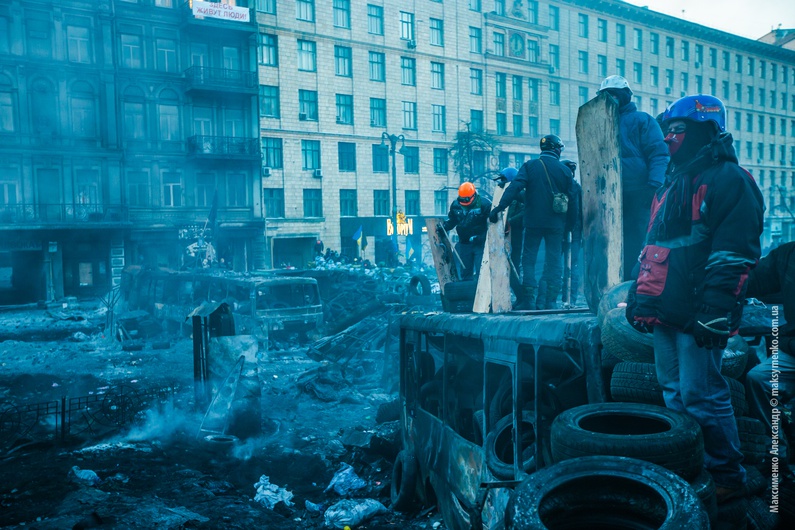 Ukraine could be described as a a schizophrenic country, split, as it is, roughly half and half between Russian speakers in the east and Ukrainian speakers in the west. Since voting is typically aligned with linguistic geography, Klitschko’s appeal impressively traverses these traditional boundaries. The same certainly cannot be said for the current Russian-speaking president Viktor Yanukovych. Yanukovych’s support base lies in the Russian speaking East and South regions of Ukraine. He has struggled with the Ukrainian language throughout his political career and his numerous gaffes serve to highlight the difficulty of unifying a country that is so divided. Visiting the Ukrainian-speaking city of Lvov during his 2010 presidential campaign, a slip of the tongue saw Yanukovych confuse genocide and gene-pool and congratulate the locals on having the best genocide in the country. Klitschko, on the other hand, speaks both Russian and Ukrainian. Although he extols the benefits of closer integration with the EU, he has been careful not to alienate the Russian-speaking east like Yushchenko and Tymoshenko. His diplomacy is not only a sensible ploy from his own perspective, but it is also promising for Ukraine that this potential president is so conciliatory in a country that has become accustomed to polarising politicians.
Ukraine could be described as a a schizophrenic country, split, as it is, roughly half and half between Russian speakers in the east and Ukrainian speakers in the west. Since voting is typically aligned with linguistic geography, Klitschko’s appeal impressively traverses these traditional boundaries. The same certainly cannot be said for the current Russian-speaking president Viktor Yanukovych. Yanukovych’s support base lies in the Russian speaking East and South regions of Ukraine. He has struggled with the Ukrainian language throughout his political career and his numerous gaffes serve to highlight the difficulty of unifying a country that is so divided. Visiting the Ukrainian-speaking city of Lvov during his 2010 presidential campaign, a slip of the tongue saw Yanukovych confuse genocide and gene-pool and congratulate the locals on having the best genocide in the country. Klitschko, on the other hand, speaks both Russian and Ukrainian. Although he extols the benefits of closer integration with the EU, he has been careful not to alienate the Russian-speaking east like Yushchenko and Tymoshenko. His diplomacy is not only a sensible ploy from his own perspective, but it is also promising for Ukraine that this potential president is so conciliatory in a country that has become accustomed to polarising politicians.
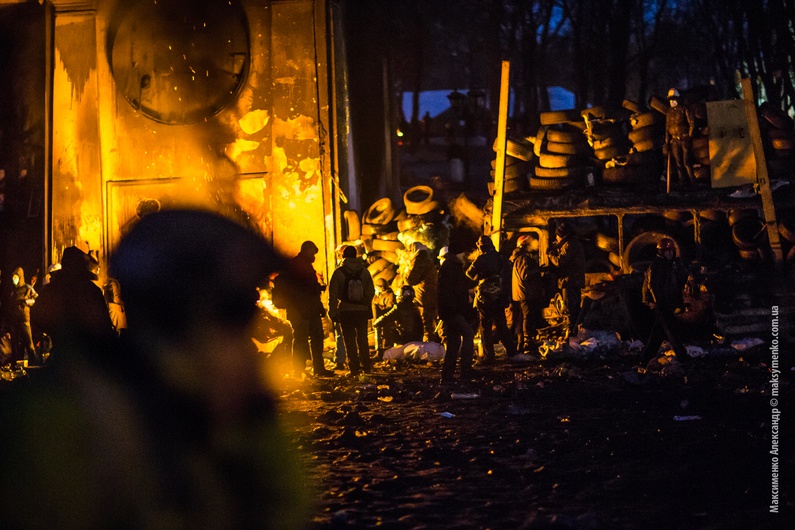 The situation in Ukraine is shifting every hour. Yanukovych is wavering, refusing to engage with the opposition, before suddenly offering them government positions on Saturday. The Ministry of Justice has been occupied. Justice Minister, Olena Lukash, has threatened to introduce a state of emergency. One protestor told reporters, ‘The seizure of the Ministry of Justice is a symbolic act of the people of the uprising. Now, these authorities are stripped of justice.’ It is likely that if Lukash calls a state of emergency, many of the troops and police called in to restore order would side with the sentiments of the aforementioned protestor. Calling a state of emergency could catalyse the disintegration of the Yanukovych regime. Yanukovych may have some more low blows in his locker, but so far Dr. Iron Fist’s composure and sincerity have proved unstoppable forces.
The situation in Ukraine is shifting every hour. Yanukovych is wavering, refusing to engage with the opposition, before suddenly offering them government positions on Saturday. The Ministry of Justice has been occupied. Justice Minister, Olena Lukash, has threatened to introduce a state of emergency. One protestor told reporters, ‘The seizure of the Ministry of Justice is a symbolic act of the people of the uprising. Now, these authorities are stripped of justice.’ It is likely that if Lukash calls a state of emergency, many of the troops and police called in to restore order would side with the sentiments of the aforementioned protestor. Calling a state of emergency could catalyse the disintegration of the Yanukovych regime. Yanukovych may have some more low blows in his locker, but so far Dr. Iron Fist’s composure and sincerity have proved unstoppable forces.



